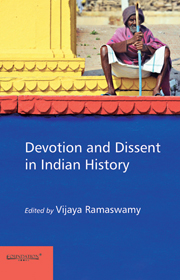Book contents
- Frontmatter
- Dedication
- Contents
- List of Tables and Figures
- Foreword
- Preface
- Introduction: Locating Devotion in Dissent and Dissent in Devotion A Thematic Overview
- Introduction
- 1 Parsing of Devotion and Dissent
- 2 Dissent and Protest in Early Indian Buddhism with Special Reference to Devadatta
- 3 Devotion and Dissent in Hunter's Bhakti
- 4 Devotion and Dissent
- 5 Dissent Within
- 6 Women in Love
- 7 Dissenting Voices
- 8 Dissent in Kabir and the Kabir Panth
- 9 Devotion and Dissent of Punjabi Dalit Sant Poets
- 10 Protest and Counter-protest
- 11 Fakirs of Bengal
- 12 Music in Chishti Sufism
- 13 Dissenting the Dominant
- 14 Devotion and Dissent within the Catholic Church in Late Colonial Bengal
- 15 Narratives of Travel, Voices of Dissent and Attacks on the Colonial Church Fabric of the European Missionaries
- 16 Devotion and Dissent in Narayana Guru
- 17 Sree Narayana Guru's Idioms of the Spiritual and the Worldly
- Contributors
- Index
8 - Dissent in Kabir and the Kabir Panth
from Introduction: Locating Devotion in Dissent and Dissent in Devotion A Thematic Overview
Published online by Cambridge University Press: 05 October 2014
- Frontmatter
- Dedication
- Contents
- List of Tables and Figures
- Foreword
- Preface
- Introduction: Locating Devotion in Dissent and Dissent in Devotion A Thematic Overview
- Introduction
- 1 Parsing of Devotion and Dissent
- 2 Dissent and Protest in Early Indian Buddhism with Special Reference to Devadatta
- 3 Devotion and Dissent in Hunter's Bhakti
- 4 Devotion and Dissent
- 5 Dissent Within
- 6 Women in Love
- 7 Dissenting Voices
- 8 Dissent in Kabir and the Kabir Panth
- 9 Devotion and Dissent of Punjabi Dalit Sant Poets
- 10 Protest and Counter-protest
- 11 Fakirs of Bengal
- 12 Music in Chishti Sufism
- 13 Dissenting the Dominant
- 14 Devotion and Dissent within the Catholic Church in Late Colonial Bengal
- 15 Narratives of Travel, Voices of Dissent and Attacks on the Colonial Church Fabric of the European Missionaries
- 16 Devotion and Dissent in Narayana Guru
- 17 Sree Narayana Guru's Idioms of the Spiritual and the Worldly
- Contributors
- Index
Summary
Over the years, my interest in the Kabir Panth and Kabir has often centred on the social dimensions of the beliefs and practices that they have advocated and, more specifically, on the dissent they have expressed against the more dominant socio-religious ideology of varnashramadharma. In general, I have argued in favour of the view that the social and religious dissent that Kabir and his followers have fostered has had important consequences, even though there never existed much chance for them to break the hegemony of upper-caste dominance. The present essay will criticize some of the arguments that have been used by other scholars to largely discount the importance of the socio-religious dissent promoted by Kabir and his followers against the varnashramadharma ideology. The essay will also discuss some of the ideas about Kabir's socio-religious ideology presented by Purushottam Agrawal in his new book, Akath Kahani Prem ki: Kabir ki Kavita aur unka Samay. First, however, I need to, very briefly, review a few of the salient features of the dissent found in the compositions of Kabir and the Kabir Panth.
Kabir's compositions are remarkable for his insistence on the necessity for both religious and social reform. He attacks not only superficial and superstitious religious rituals in both Hindu religion and Islam but also the sacred authority of religious texts: the Vedas, the Puranas and the Koran. He also attacks the pretensions to social superiority of high-class persons, particularly Brahmins and kazis, often with amusing but quite vicious satire. Today, he would undoubtedly be hauled before a court of justice for his insults to both the Hindu and Muslim religions and for fomenting religious conflict.
- Type
- Chapter
- Information
- Devotion and Dissent in Indian History , pp. 169 - 187Publisher: Foundation BooksPrint publication year: 2014
- 2
- Cited by



